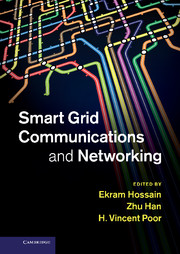Book contents
- Frontmatter
- Contents
- List of contributors
- Preface
- Part I Communication architectures and models for smart grid
- Part II Physical data communications, access, detection, and estimation techniques for smart grid
- Part III Smart grid and wide-area networks
- Part IV Sensor and actuator networks for smart grid
- Part V Security in smart grid communications and networking
- Part VI Field trials and deployments
- 20 Case studies and lessons learned from recent smart grid field trials
- Index
20 - Case studies and lessons learned from recent smart grid field trials
from Part VI - Field trials and deployments
Published online by Cambridge University Press: 05 January 2013
- Frontmatter
- Contents
- List of contributors
- Preface
- Part I Communication architectures and models for smart grid
- Part II Physical data communications, access, detection, and estimation techniques for smart grid
- Part III Smart grid and wide-area networks
- Part IV Sensor and actuator networks for smart grid
- Part V Security in smart grid communications and networking
- Part VI Field trials and deployments
- 20 Case studies and lessons learned from recent smart grid field trials
- Index
Summary
Introduction
The power industry has recently undergone a significant transformation of their information and communication technology (ICT) systems to support both current and future business models of smart grid operations. Moreover, the power industry is transforming from the traditional models of business to embrace a number of new and enhanced technologies that support future smart grid operations. This chapter discusses several smart grid field trials of the last few years. We summarize these field trials in three categories: (i) smart power grids, which include the Jeju smart grid testbed, ADS programme for Hydro One, and the SmartHouse project; (ii) smart electricity systems, which include intelligent protection relay; and (iii) smart consumers, which include several dynamic pricing schemes tested by PEPCO, Commonwealth Edison, Connecticut light and power, and California statewide pricing pilot. At the end of the chapter, we briefly discuss the lessons learned from these smart grid field trials.
Smart power grids
A smart power grid is a power grid that allows various kinds of interconnections between areas for energy consumers and energy supply sources. The rolling out of such networks will pave the way for new business models and for the building of a power grid selfdetecting and automatic recovery system that will ensure a reliable and high-quality power supply. In this section, we give an overview of three recent smart power grid pilot projects, the Jeju smart grid testbed, ADS programme for Hydro One, and the SmartHouse project.
Information
- Type
- Chapter
- Information
- Smart Grid Communications and Networking , pp. 465 - 477Publisher: Cambridge University PressPrint publication year: 2012
